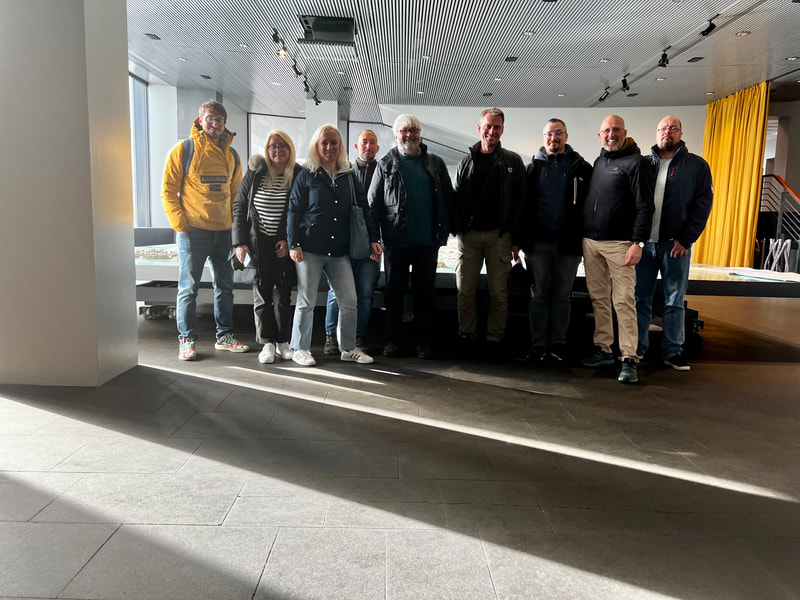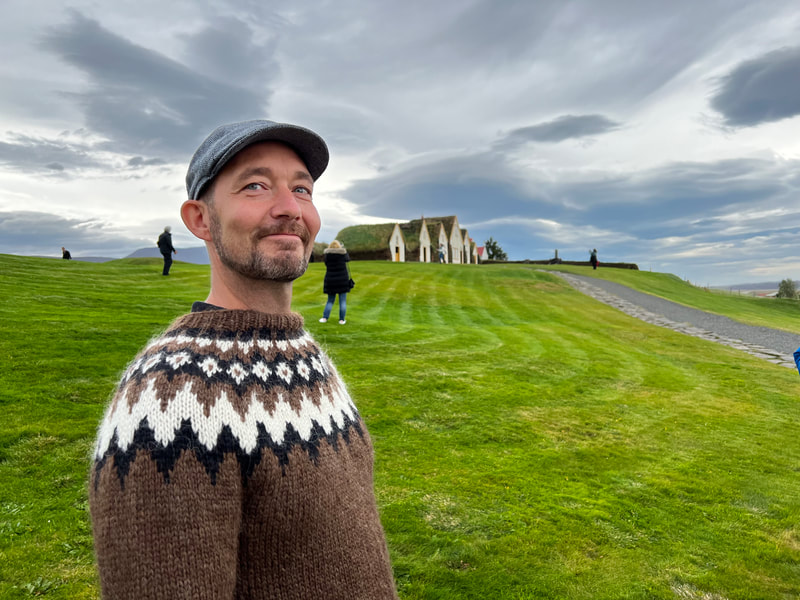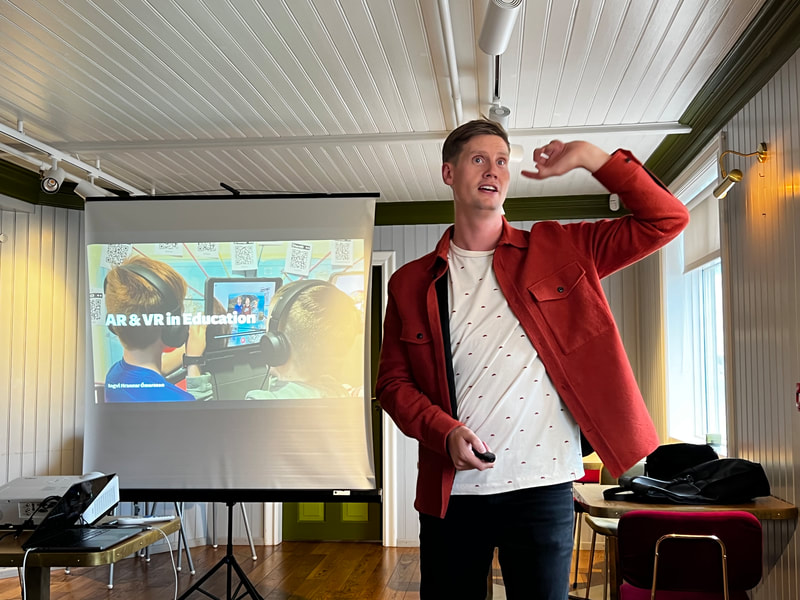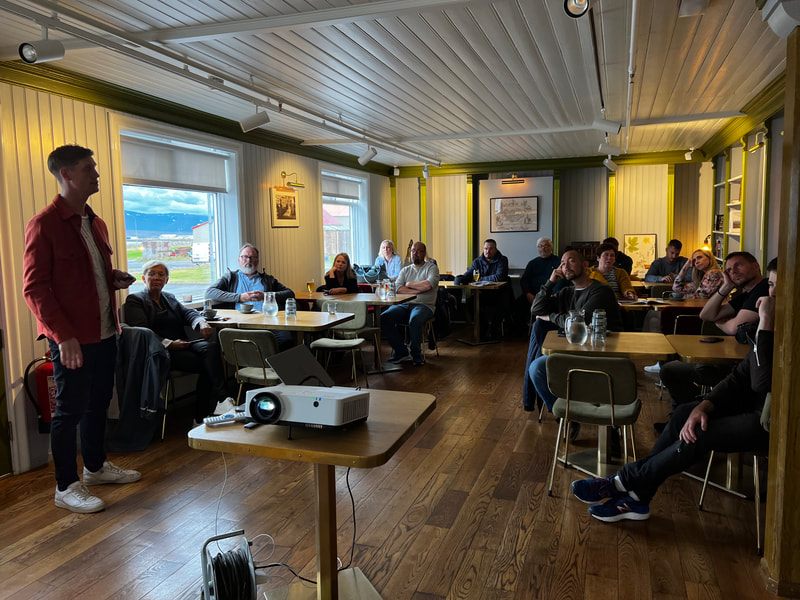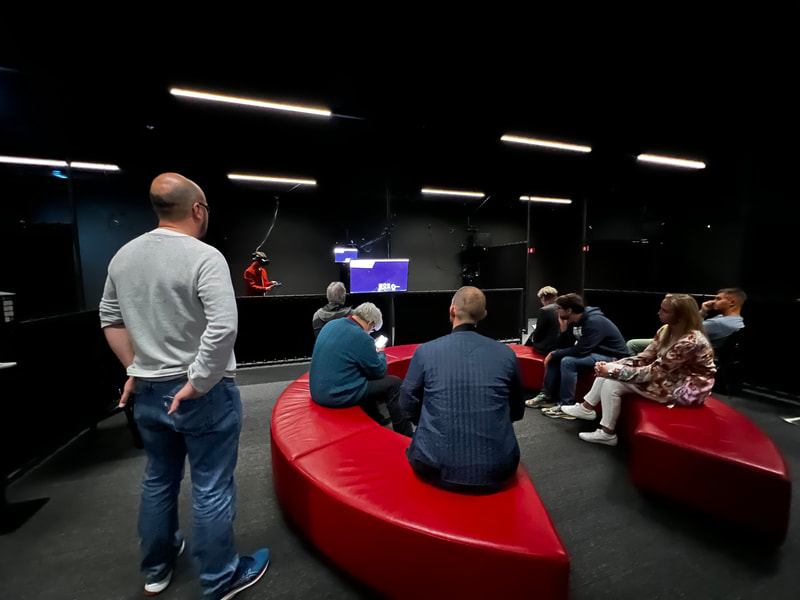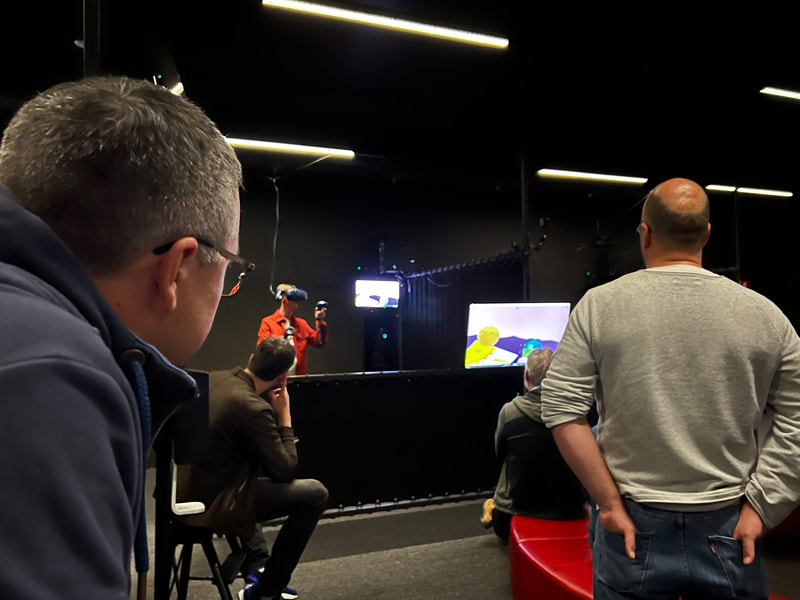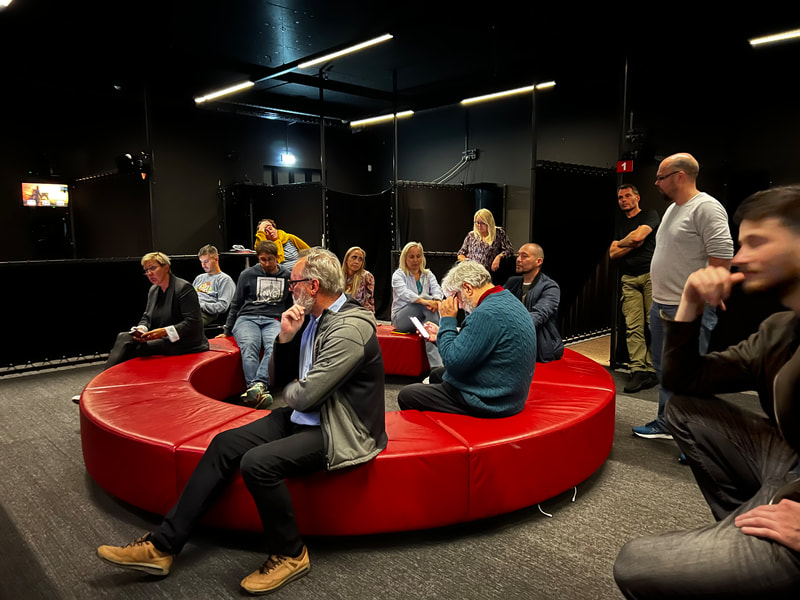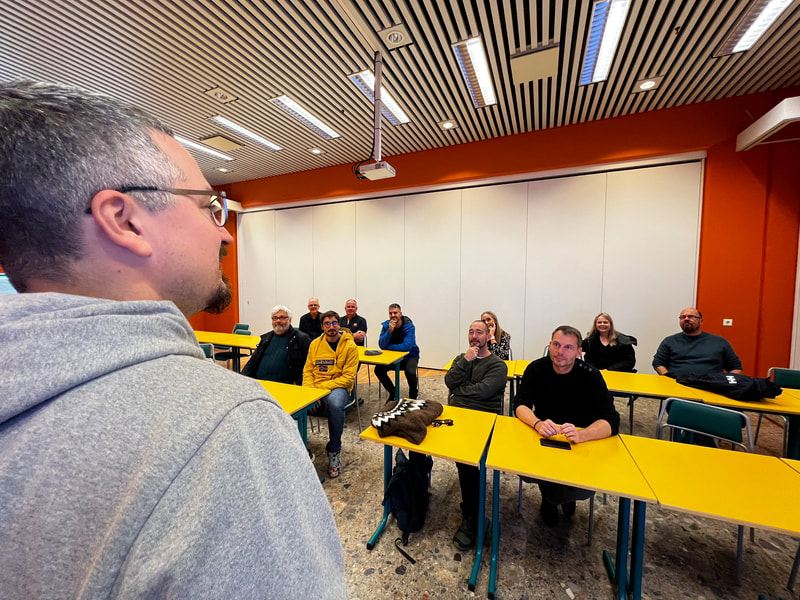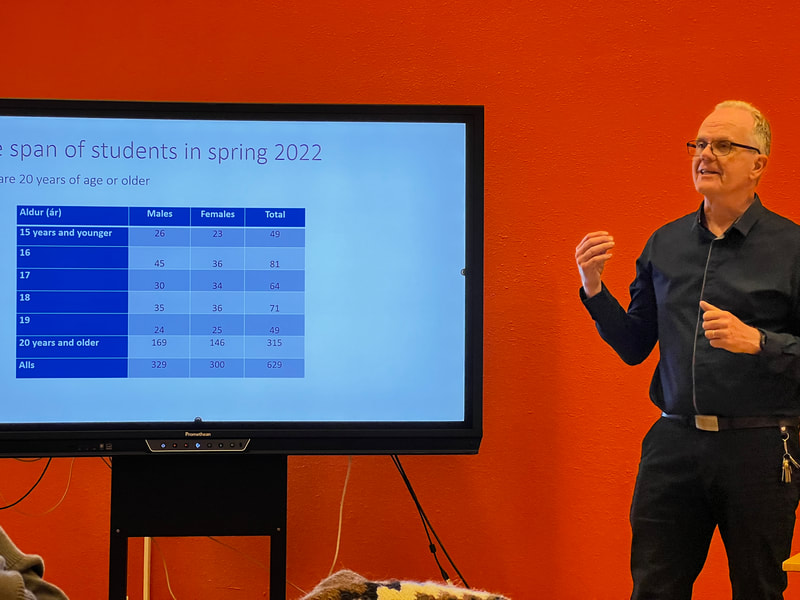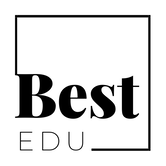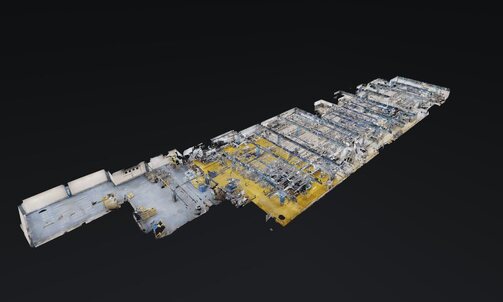 3D models and VR simulations were vital in maintaining training during Covid19
3D models and VR simulations were vital in maintaining training during Covid19
The fourth BestEDU transnational meeting (M4) took place in Iceland on 29 August - 2 September 2022. The focus of the meeting was on best practice examples in Icelandic education during Covid19 as well as innovative use in educational methods and approaches. Project partners and teachers also participated in practical use of VR & AR in education.
TRAINING SESSION: ICT in primary education and use of both VR&AR in lesson plans
Session organised and carried out by Álfhildur Leifsdóttir at Árskóli Primary School and Ingvar Hrannar Ómarsson from the Ministry of Education. As part of the training activities, the partnership group prepared and practiced use of VR in science education during a half day session at 1238 The Battle of Iceland Museum in Sauðárkrókur, Iceland, which was used for primary school students while it was closed down for general public during Covid19.
"The training session at 1238 – The Battle of Iceland was a unique experience and showed me, how VR can be used in a way, which makes learning fully immersive and lively. As a history teacher I am focused on, how history can come to life through both the living word and rich resources. A continuous struggle is to let students experience history – because it requires a high level of abstraction. VR has potentials here to both let the emerge into the past and still experience artefacts and resources with historical accuracy. Same goes for AR, but here the students also can become producers of quality content. Highlighting the iterative process between analysis, reflections, and production. This way of using technology to enhance learning possibilities seem to hold great potentials." (Roland Hachmann, Unviersity College SydDanmark).
Ingvi Hrannar Ómarsson: AR & VR in Education [PDF]
Sigrún Svafa Ólafsdóttir: Flipped Learning - Summary [PDF]
Erkko Sointu: Some lessons learned from Covid19 - Success behind the scenes BestEdu project training [PDF] [Video]
SCHOOL VISITS & LECTURES
The partnership group had a total of five school visits during the transnational meeting in Iceland at:
Keilir Academy (Focus on how Flipped Learning methodology helped prepare students, teachers and school administrators for Covid19): The school presented an interesting approach for those possibly excluded from the society (i.e., don’t have background for HE studies) was something new and perhaps a one lesson we should consider. Covid caused higher risk for social and educational exclusion and this challenge has not yet to be overcome as we will pay for the causes of covid in the future in this context. Thus, support mechanisms learnt at Keilir for educational (and social) inclusion are important.
Icelandic College of Fisheries (Focus vocational education and training opportunities during Covid19, how they had to change and adapt their approach): The school presented interesting ways to collaborative in a large, rural and sea areas for the student and with various types of educational and fishing professionals. In this technology plays an interesting role to steer the learning of profession at the covid and post covid. This was again a case that the covid was not such a problems.
"A venture with fishing companies has been to digitise the interiors of fishing vessels, and this has started with factory trawler Ilivileq, operated by Brim subsidiary Arctic Prime Fisheries in Greenland. This entails producing a 3D version of the interior of each vessel, with links throughout with explanations of the safety and hygiene systems on board, with this project developed by Bernharð Aðalsteinsson.
The whole of Brim’s Norðurgarður processing plant in Reykjavík has been simulated to give staff access to information about their workplace. There are explanations for everything and it’s a way of giving new crew an opportunity to go through the whole ship virtually. You can have it all there on your phone. If there’s some space on board that a crewman isn’t familiar with, he can look it up immediately. Any of the crew or staff can scroll through the digital version of their workplace, whether it’s a fishing vessel or a factory on shore, and find any installation that they might not be sure of. A quick tap of the screen brings up information panels that immediately identify and explain hygiene and safety systems."
Árskóli Primary School in Sauðárkrókur (Focus on use of ICT in primary education): The visit began with a tour in the school that was held by the school pupils. During this tour, we met schoolteachers from different subjects and had the opportunity to hear how pupils themselves experience schooling and ICT in education. After the tour, we gathered to discuss with the principal and teachers of the school. We learned how this school had been developing ICT education for many years before Covid-19 and thus, they were able to adapt to online teaching when the pandemic closed their school. Behind such a success story was deliberate support provided by the school administration, including training, coaching and other forms of professional development for teachers. In other words, the long-term community building and sustained co-development of innovative teaching practices appeared to be in a key role when facing and adapting to unforeseen challenges caused by the Covid-19.
FNV Comprehensive College & FabLab: The visit gave us the opportunity to hear perspectives from vocational education in Iceland. Again we had the opportunities to discuss and learn first-hand from the school teachers. It was especially interesting to see and hear how ICT and machinery was harnessed in designing and making physical artifacts and products, i.e. illustrating the transformation in professions that used to involve a lot of handicraft skills. Meanwhile, the visit to FabLab gave a perspective that use of such novel and innovative technologies should not be the privilege of a few, but everyone should have equal opportunities to develop new skills and ways of thinking needed in the digital era.
"This vocational training facilities were innovative, but from my understanding this school had some challenges with during covid (e.g., restricting people access to each other etc.). However, this may also be as the learning environments were a bit growded and challenging in general. Still, the setting we good, and the school was able to provide training for their students. It was interesting was the setting of “old-school” and “new-school” machinery, and that the students learn easily to master the new-school machinery with the precision. I did not get so much grip from this school about their practices during covid, but this may be the fact that covid did not cause so strong need for distance learning as perhaps elsewhere. Likewise the Fablab work during covid was not so clear (perhaps as it was not closed?) but the settings there were awesome. Also the potential for this setting for larger audience should be considered, perhaps this is not the challenge of the lab itself but challenge of the understanding of the potential for schools and community around the area." (Erkko Sointu, University of Eastern Finland)
Hólar University (Focus on adaptation of university programmes in times of Covid19): Holar University that specializes in aquaculture, equine studies, and tourism. The team saw several aspects that could be learnt from Hólar especially regarding quality online and hybrid training with the attitude of staff in the university.
"I found this visit particularly interesting, as there was a lot of discussion on how to transform teaching of complex skills online, such as those related to horse riding and riding instruction. These real-life experiences of facing COVID-19 promoted a lot of discussion on what can be taught online and where face-to-face interaction and instruction is a necessity. I believe that such discussions are highly important for ensuring the quality and safety of teaching, especially in situations where schools must adapt to unforeseen circumstances." (Henriikka Vartiainen, University of Eastern Finland)
Bifröst University (Focus on the importance of distance learning oportunities within university education): The university has a lot of experience in online teaching. Again, we learned how sustained and long-term development of learning environments, tools and practices for high quality online teaching was a great asset when facing global pandemic. It was also great to hear how this university was sharing their knowledge and helping other schools and teachers when the pandemic was closing schools. Moreover, we also learned how data-driven decision making had become part of their online teaching practices and was used, for example, for proactively contacting the students with potential risk of dropping out.
"The idea of doing very hands-on distance learning modules, where students practice their skills through project-based learning and collaborate in groups on a real-time project is both relevant and challenging. The talk moved from a description of the school and the possibilities there to a deeper talk about ethics, people skills and other intangible things which are very hard to grasp and foresee when they happen online. The meeting planted thoughts about "the human aspect" of education/upbringing/bildung when everything happens at an asynchronous distance from the teacher.
Our conversation also delved into materials and video as a teaching tool, and this led to a debate about whether the video made by the teacher should be or can be "polished and produced" or whether they should be more authentic and not so nice and in a super quality when used in a learning context.
I would like to work further with the aspect around video and I would like to know more about how to achieve authenticity, closeness to practice and good project-based teaching when it takes place 100% online more specifically. It amazes me how to organize group work when the work is independent of both time and place." (Peter Holmboe, University College SydDenmark)
KEY TAKEAWAY: Iceland was well prepared for the Lockdown
A repeated line was, that the Covid-lockdown was not a bad thing and neither a huge disruption. On the contrary many of the schools (e.g. Keilir Academy, Árskóli Primary School) stressed, how they were well prepared for moving online due to their tradition for, and experiences in distant learning. This was quite surprising to hear, because the common understanding is, that the lockdown brought great struggles to schools and institutions.
Educating people where they live and keep them in rural areas is crucial to Islandic growth, and therefore “distance” in e-learning Is an important aspect. I experienced that this tradition of many years of distance teaching was helpful in the move from physical classrooms to online teaching. Both the “how” and the “what” could however be investigated further. It was often unclear exactly what the learning content was, and which pedagogical frameworks where used. This could be a theme for further explorations and sharing.
Teaching theory and practice, and combining them
Visiting the different schools, it was interesting to see, how different approaches were taken in teaching both theoretical and practical aspects of the subject domains. For instance, at the College of Fisheries we learned, that the fishing industry is being heavily atomized (industry 4.0) and therefor the very core of knowledge domains has changed. Further we learned that the use of 3D-simulation was used to prepare students for their future professions. An interesting discussion here was, how these simulations supported learning and in how the relation between theory and practice played out.
This notion of theory and practice was also debated at the Hólar University, where the importance of physical practice was stressed, when training with horses. The complexity of communication was drawn into the front of discussions, and this could be an important aspect to discuss regarding asynchronous and synchronous teaching. Are there important aspects of communication that is lost? Which new communication forms are provided and what is their potentials? There is a rich research tradition within CSCL (Computer Supported Collaborative Learning) that could prove fruitful for further discussion. Another point here would be a discussion on the pros and cons of online learning regarding individual versus collaborative processes.
TRAINING SESSION: ICT in primary education and use of both VR&AR in lesson plans
Session organised and carried out by Álfhildur Leifsdóttir at Árskóli Primary School and Ingvar Hrannar Ómarsson from the Ministry of Education. As part of the training activities, the partnership group prepared and practiced use of VR in science education during a half day session at 1238 The Battle of Iceland Museum in Sauðárkrókur, Iceland, which was used for primary school students while it was closed down for general public during Covid19.
"The training session at 1238 – The Battle of Iceland was a unique experience and showed me, how VR can be used in a way, which makes learning fully immersive and lively. As a history teacher I am focused on, how history can come to life through both the living word and rich resources. A continuous struggle is to let students experience history – because it requires a high level of abstraction. VR has potentials here to both let the emerge into the past and still experience artefacts and resources with historical accuracy. Same goes for AR, but here the students also can become producers of quality content. Highlighting the iterative process between analysis, reflections, and production. This way of using technology to enhance learning possibilities seem to hold great potentials." (Roland Hachmann, Unviersity College SydDanmark).
Ingvi Hrannar Ómarsson: AR & VR in Education [PDF]
Sigrún Svafa Ólafsdóttir: Flipped Learning - Summary [PDF]
Erkko Sointu: Some lessons learned from Covid19 - Success behind the scenes BestEdu project training [PDF] [Video]
SCHOOL VISITS & LECTURES
The partnership group had a total of five school visits during the transnational meeting in Iceland at:
Keilir Academy (Focus on how Flipped Learning methodology helped prepare students, teachers and school administrators for Covid19): The school presented an interesting approach for those possibly excluded from the society (i.e., don’t have background for HE studies) was something new and perhaps a one lesson we should consider. Covid caused higher risk for social and educational exclusion and this challenge has not yet to be overcome as we will pay for the causes of covid in the future in this context. Thus, support mechanisms learnt at Keilir for educational (and social) inclusion are important.
Icelandic College of Fisheries (Focus vocational education and training opportunities during Covid19, how they had to change and adapt their approach): The school presented interesting ways to collaborative in a large, rural and sea areas for the student and with various types of educational and fishing professionals. In this technology plays an interesting role to steer the learning of profession at the covid and post covid. This was again a case that the covid was not such a problems.
"A venture with fishing companies has been to digitise the interiors of fishing vessels, and this has started with factory trawler Ilivileq, operated by Brim subsidiary Arctic Prime Fisheries in Greenland. This entails producing a 3D version of the interior of each vessel, with links throughout with explanations of the safety and hygiene systems on board, with this project developed by Bernharð Aðalsteinsson.
The whole of Brim’s Norðurgarður processing plant in Reykjavík has been simulated to give staff access to information about their workplace. There are explanations for everything and it’s a way of giving new crew an opportunity to go through the whole ship virtually. You can have it all there on your phone. If there’s some space on board that a crewman isn’t familiar with, he can look it up immediately. Any of the crew or staff can scroll through the digital version of their workplace, whether it’s a fishing vessel or a factory on shore, and find any installation that they might not be sure of. A quick tap of the screen brings up information panels that immediately identify and explain hygiene and safety systems."
Árskóli Primary School in Sauðárkrókur (Focus on use of ICT in primary education): The visit began with a tour in the school that was held by the school pupils. During this tour, we met schoolteachers from different subjects and had the opportunity to hear how pupils themselves experience schooling and ICT in education. After the tour, we gathered to discuss with the principal and teachers of the school. We learned how this school had been developing ICT education for many years before Covid-19 and thus, they were able to adapt to online teaching when the pandemic closed their school. Behind such a success story was deliberate support provided by the school administration, including training, coaching and other forms of professional development for teachers. In other words, the long-term community building and sustained co-development of innovative teaching practices appeared to be in a key role when facing and adapting to unforeseen challenges caused by the Covid-19.
FNV Comprehensive College & FabLab: The visit gave us the opportunity to hear perspectives from vocational education in Iceland. Again we had the opportunities to discuss and learn first-hand from the school teachers. It was especially interesting to see and hear how ICT and machinery was harnessed in designing and making physical artifacts and products, i.e. illustrating the transformation in professions that used to involve a lot of handicraft skills. Meanwhile, the visit to FabLab gave a perspective that use of such novel and innovative technologies should not be the privilege of a few, but everyone should have equal opportunities to develop new skills and ways of thinking needed in the digital era.
"This vocational training facilities were innovative, but from my understanding this school had some challenges with during covid (e.g., restricting people access to each other etc.). However, this may also be as the learning environments were a bit growded and challenging in general. Still, the setting we good, and the school was able to provide training for their students. It was interesting was the setting of “old-school” and “new-school” machinery, and that the students learn easily to master the new-school machinery with the precision. I did not get so much grip from this school about their practices during covid, but this may be the fact that covid did not cause so strong need for distance learning as perhaps elsewhere. Likewise the Fablab work during covid was not so clear (perhaps as it was not closed?) but the settings there were awesome. Also the potential for this setting for larger audience should be considered, perhaps this is not the challenge of the lab itself but challenge of the understanding of the potential for schools and community around the area." (Erkko Sointu, University of Eastern Finland)
Hólar University (Focus on adaptation of university programmes in times of Covid19): Holar University that specializes in aquaculture, equine studies, and tourism. The team saw several aspects that could be learnt from Hólar especially regarding quality online and hybrid training with the attitude of staff in the university.
"I found this visit particularly interesting, as there was a lot of discussion on how to transform teaching of complex skills online, such as those related to horse riding and riding instruction. These real-life experiences of facing COVID-19 promoted a lot of discussion on what can be taught online and where face-to-face interaction and instruction is a necessity. I believe that such discussions are highly important for ensuring the quality and safety of teaching, especially in situations where schools must adapt to unforeseen circumstances." (Henriikka Vartiainen, University of Eastern Finland)
Bifröst University (Focus on the importance of distance learning oportunities within university education): The university has a lot of experience in online teaching. Again, we learned how sustained and long-term development of learning environments, tools and practices for high quality online teaching was a great asset when facing global pandemic. It was also great to hear how this university was sharing their knowledge and helping other schools and teachers when the pandemic was closing schools. Moreover, we also learned how data-driven decision making had become part of their online teaching practices and was used, for example, for proactively contacting the students with potential risk of dropping out.
"The idea of doing very hands-on distance learning modules, where students practice their skills through project-based learning and collaborate in groups on a real-time project is both relevant and challenging. The talk moved from a description of the school and the possibilities there to a deeper talk about ethics, people skills and other intangible things which are very hard to grasp and foresee when they happen online. The meeting planted thoughts about "the human aspect" of education/upbringing/bildung when everything happens at an asynchronous distance from the teacher.
Our conversation also delved into materials and video as a teaching tool, and this led to a debate about whether the video made by the teacher should be or can be "polished and produced" or whether they should be more authentic and not so nice and in a super quality when used in a learning context.
I would like to work further with the aspect around video and I would like to know more about how to achieve authenticity, closeness to practice and good project-based teaching when it takes place 100% online more specifically. It amazes me how to organize group work when the work is independent of both time and place." (Peter Holmboe, University College SydDenmark)
KEY TAKEAWAY: Iceland was well prepared for the Lockdown
A repeated line was, that the Covid-lockdown was not a bad thing and neither a huge disruption. On the contrary many of the schools (e.g. Keilir Academy, Árskóli Primary School) stressed, how they were well prepared for moving online due to their tradition for, and experiences in distant learning. This was quite surprising to hear, because the common understanding is, that the lockdown brought great struggles to schools and institutions.
Educating people where they live and keep them in rural areas is crucial to Islandic growth, and therefore “distance” in e-learning Is an important aspect. I experienced that this tradition of many years of distance teaching was helpful in the move from physical classrooms to online teaching. Both the “how” and the “what” could however be investigated further. It was often unclear exactly what the learning content was, and which pedagogical frameworks where used. This could be a theme for further explorations and sharing.
Teaching theory and practice, and combining them
Visiting the different schools, it was interesting to see, how different approaches were taken in teaching both theoretical and practical aspects of the subject domains. For instance, at the College of Fisheries we learned, that the fishing industry is being heavily atomized (industry 4.0) and therefor the very core of knowledge domains has changed. Further we learned that the use of 3D-simulation was used to prepare students for their future professions. An interesting discussion here was, how these simulations supported learning and in how the relation between theory and practice played out.
This notion of theory and practice was also debated at the Hólar University, where the importance of physical practice was stressed, when training with horses. The complexity of communication was drawn into the front of discussions, and this could be an important aspect to discuss regarding asynchronous and synchronous teaching. Are there important aspects of communication that is lost? Which new communication forms are provided and what is their potentials? There is a rich research tradition within CSCL (Computer Supported Collaborative Learning) that could prove fruitful for further discussion. Another point here would be a discussion on the pros and cons of online learning regarding individual versus collaborative processes.
